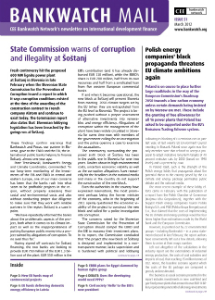EIB lending figures in 2011: Germany 6 – Greece 1

Bankwatch Mail | 13 March 2012
For a bank tasked to contribute to the ‘balanced and steady’ development of the internal market in the interest of the EU, the EIB’s figures for its financing operations in 2011 (released last month at its annual press conference) induced a certain amount of head-scratching here at Bankwatch Mail.
To look at the numbers given for the geographical breakdown of finance contracts signed by the ‘EU bank’ in 2011, you could be forgiven for wondering which European countries are most in need of vital investment support at a time like this. While Germany received 10 percent (or over EUR 6 billion) of the EIB pie in 2011, Greece scraped by on 1.6 percent, a mere EUR 958 million. During a recent visit to Greece, new EIB president Werner Hoyer described the EIB’s record lending of some EUR 2 billion to Greece in 2011. But this calls into question the large discrepancy between actual lending (Hoyer’s EUR 2 billion in disbursements in 2011) and signed contract volumes in 2011 (EUR 958 million according to the latest EIB press pack) – surely the EIB is not going to pull back its support for Greece now just as the country is being bled dry by the Troika’s austerity measures and the financial markets?
Looking further at the EIB figures, it’s striking how little investment is being lined up for struggling central and eastern European economies, with the exception of relatively comfortable Poland that received 8.7 percent of the EIB total in 2011. Bulgaria (0.3 percent, Estonia (0.3 percent), Latvia (0.1 percent), Lithuania (o.o percent, though actually EUR 11 million in signed commitments), Romania (1.5 percent) and Slovakia (0.7 percent) clearly don’t have enough major shovel-ready road projects or large fossil fuel power plants in the pipeline to attract EIB interest.
Never miss an update
We expose the risks of international public finance and bring critical updates from the ground. We believe that the billions of public money should work for people and the environment.
STAY INFORMED
